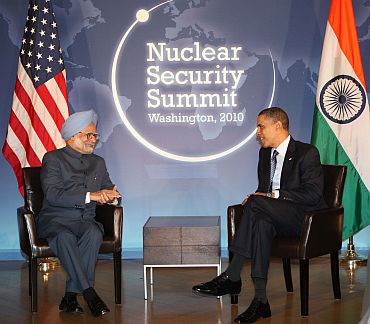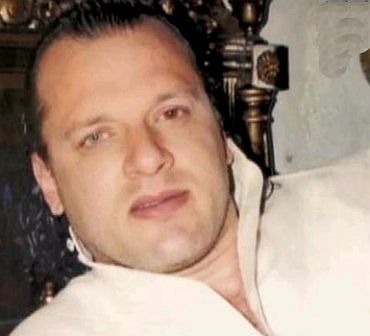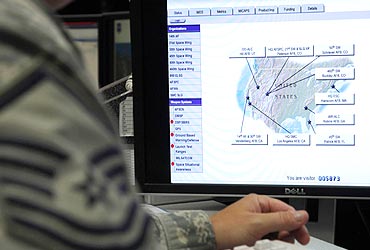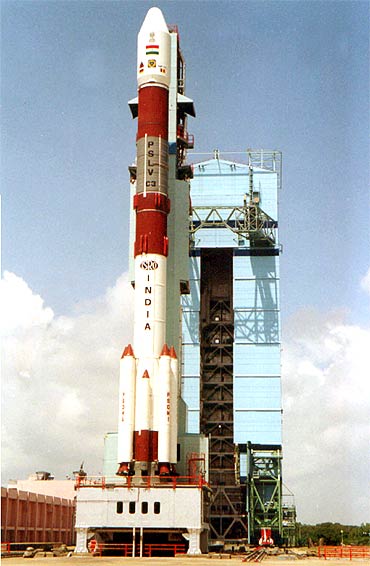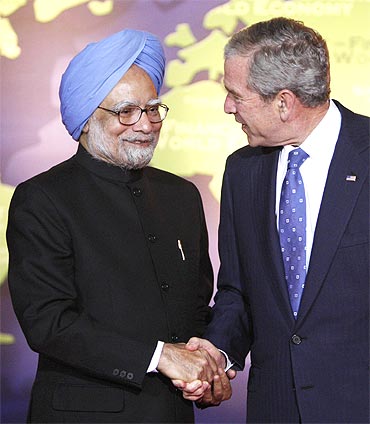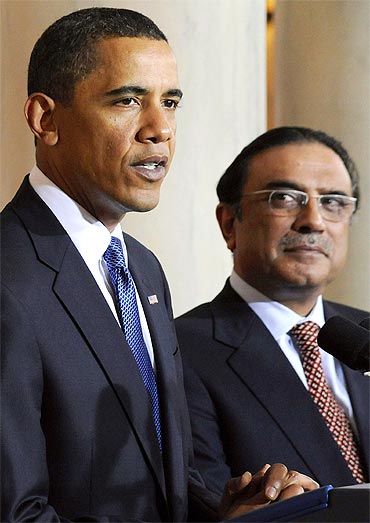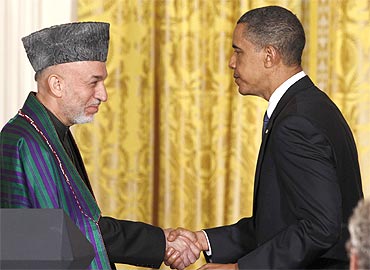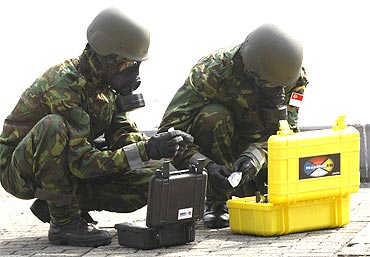This article was first published 14 years ago
Home »
News » Manmohan's secret list for Obama
Manmohan's secret list for Obama
Last updated on: November 7, 2010 18:54 IST
Image: Prime Minister Manmohan Singh with US President Barack Obama
Ten major secret issues pertaining to India were discussed between Prime Minister Manmohan Singh and President Barack Obama at the prime minister's home, 7, Race Course Road, when they met one-to-one, just before the prime minister's dinner for the visiting leader on Sunday night.
Despite being a policy document, the Prime Minister's Office prepared it for background purposes.
These issues will also be discussed at Hyderabad House on Monday when the leaders meet with their respective teams.
Recognising that President Obama's visit was not aimed to achieve immediate goals, a policy brief circulated amongst top strategists and government officials by the PMO suggests building a base for long term India-US relations for 2020.
The policy summarises the conclusion of a study commissioned to various think-tanks ahead of the presidential visit.
The informal brainstorming group, which includes National Security Adviser Shiv Shankar Menon, former NSA during the National Democratic Alliance Brajesh Mishra and former ambassadors to the US Naresh Chandra and K S Bajpai will help sensitise US officials during the formal and informal interactions between the two sides.
The brief realises that while the strategic partnership of July 2005 laid out a roadmap for the two countries in various sectors, the assessment shows that the pace of this partnership has been 'uneven.'
Significantly, Pete Dagher, formerly chief of staff for Obama's presidential campaign, recently told an Indian audience that India needs to lobby hard in Washington, DC with an imaginative mix of vision and deft planning to achieve its strategic goals.
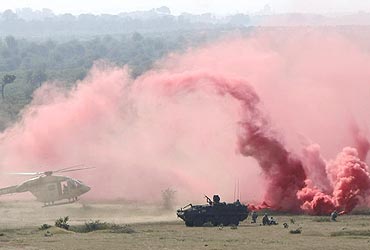
Image: Indian and US soldiers during a military exercise in Babina, UP
Photographs: Adnan Abidi/Reuters
D
efence: On the issue of defence cooperation, the policy brief outlines that the Communications Interoperability and Security Memorandum of Agreement (CISMOA) was a roadblock, while agreeing that the US has long standing laws that limit defence transfers and India could not demand treatment superior to that offered to American allies like the UK.
The policy brief suggests that Washington should make sure that defence commerce between the US and India should follow the rules of the World Trade Organisation, which means using the Most Favoured Nation tag.
The US should treat India in matters of defence transfers in no less a favourable manner than it treats its other customers, who are not bound by a military alliance.
In general, if a principle of reciprocity and freedom of choice is maintained, the chances of further defence cooperation will be substantially enhanced.
Image: Lashkar-e-Tayiba operative David Coleman Headley
Photographs: Rediff.com
C
ounter-terrorism and intelligence sharing: By participating in several multilateral export control regimes like the Nuclear Suppliers Group and the Missile Technology Control Regime, India could contribute to the global efforts to deny terrorist groups access to materials, technology and know-how needed to develop a Weapon of Mass Destruction.
In this process, both the US and India, however, have to overcome problems with regard to their domestic constituencies as well as legal provisions and rulings, geo-strategic compulsions and politico-military issues.
The current cooperation between them, for various reasons, appears to be uncertain.
The next decade would be a test for both partners to reach the zenith of cooperation of which intelligence sharing should be established as a firm pillar.
Image: The US Air Force Space Command Network Operations Security Centre in Colorado
Photographs: Rick Wilking/Reuters
C
yber Security: Cyber Security cooperation was mooted in 2002 when the India-US Cyber Security Forum was set up in the National Security Council Secretariat.
The partnership had a severe setback following alleged espionage involving secretariat officials responsible for the Forum and a lady US embassy official.
The paper calls for sharing best practices and coordinating approaches geared towards a common vision of ensuring that cyberspace remains open, free and secure.
Image: India's Polar Satellite Launch Vehicle at the Sriharikota spaceport
Photographs: Reuters
H
igh end Technology: India has taken the first step of harmonising its export control list in line with export control regimes.
India and the US should now seriously explore how to mange future trade dual-use technology in a manner that helps global trade without affecting international security.
Image: US President George W Bush greets Prime Minister Manmohan Singh
Photographs: Jim Young/Reuters
N
uclear Trade: Remedial measures to allay US industry's fears over the Nuclear Civil Liability Bill can be considered.
A resolution of the matter to the satisfaction of both sides would require both India and the US to abandon their current rigid positions.
If this is resolved then the way is open for further nuclear cooperation between the two countries in all matters pertaining to civilian nuclear use in the future and in particular cooperating on nuclear safety and security issues, assisting new entrants to civil nuclear power in managing their nuclear programs safely.
India with its strong base in nuclear research can join with the US in managing future global civil nuclear programmes in a manner which is equitable and non-discriminatory.
Image: Pakistan President Asif Ali Zardari with President Barack Obama at the White House
Photographs: Jonathan Ernst/Reuters
P
akistan: Besides militancy, nuclear dynamics, the war on terror and Afghanistan, US aid to Pakistan is of utmost significance.
Pakistan has been promised huge amounts of aid without any method aimed at ensuring the appropriate use of the aid.
The US administration has shown some intentions of bringing about a change in its policy towards Pakistani aid.
Ironically, these intentions have been far from being translated into policy statements.
Image: President Obama and Afghan President Hamid Karzai at the White House
Photographs: Kevin Lamarque/Reuters
A
fghanistan: As President Obama has already announced plans to start withdrawing US forces from Afghanistan from July 2011, it may be suggested that India and the US start mutually recognising each other's efforts for peace, stability and development in Afghanistan.
More significantly, the US must engage India more deeply in the deliberations on any future strategy for the solution of the Afghan issue.
Image: Singapore army personnel in gas masks as part of a drill for the Proliferation Security Initiative Exercise in Japan
Photographs: Kim Kyung Hoon/Reuters
P
roliferation Security Initiative: Recognising America's offer to become a regional policeman by joining the PSI, which lets a country check and monitor ships on the high seas, India sees missile defence as a defensive-deterrence mechanism unlike Washington which perceives it as an active defence mechanism against nuclear missiles.
Similarly, India sees the PSI as a pre-emptive tool targeting US adversaries, which India disapproves of.
Even on nuclear terrorism, India could find partnerships ineffective unless the source of proliferation and terror (read Pakistan) is adequately addressed.
